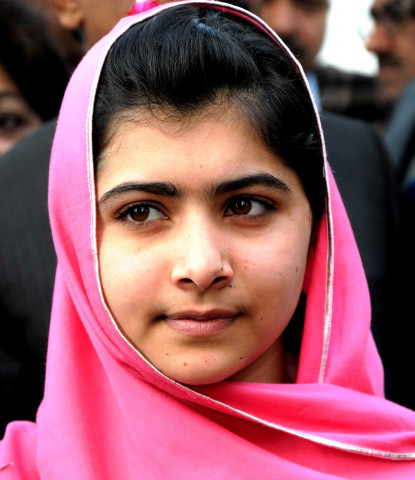Malala Day in a wasteland of women’s rights
In Pakistan, women’s rights that are ensured under Islam are being violated.

Malala Day in a wasteland of women’s rights
In Pakistan, views about what Malala achieved in the face of the Taliban tyranny, are tragically divided. The religious parties are suspicious of the events surrounding her wounding and subsequent transfer to the UK for treatment, with JUI-F chief Fazlur Rehman going as far as to say that the whole incident was a ‘drama’. Other religious parties and groups such as the PTI did condemn the attack but could not resist linking it with drone strikes, ostensibly to portray the Taliban’s diminished responsibility. Political parties and the army support Malala and her cause of girls’ education. The crisis in Pak-Afghan relations has tempted Pakistan’s interior minister to make ambiguous statements that seek to explain the Malala incident as a conspiracy hatched by the Afghan intelligence and the US military command.
The main culprit is the warlord of Swat, Maulana Fazlullah, who was defeated by the army in 2009, after the people of Pakistan were incensed by a video showing his gunmen flogging women in the valley. The army moved some 2.5 million people out of the region and sent in 80,000 troops to clear Swat of militants. But Fazlullah and his commanders escaped across the border into Kunar province, in northeastern Afghanistan. Kunar is under the control of al Qaeda affiliates, the Afghan Taliban and other groups from Central Asia, the Caucasus, China and Europe. Fazlullah has relaunched his movement and is trying to make a comeback in Swat.
Malala’s plight has given rise to the demand for a military operation in North Waziristan because Fazlullah’s deeds were being owned by the Tehreek-e-Taliban Pakistan. But military action in North Waziristan can only be undertaken with corresponding anti-militant steps by the US and Afghan military across the border. There are reports that the Afghan intelligence is not restraining Fazlullah because of the perception that for the past 12 years, Pakistan has been allowing the Afghan Taliban to launch strikes into Afghanistan against the US and Afghan forces before retreating into Pakistan.
Pakistan’s other crisis is the approximation of the thinking of a section of its population with the agenda of the Taliban terrorists. Looking at the intense anti-American feelings at the popular level, Pakistan’s political parties are reluctant to take an aggressively pro-Malala stance, in particular, and girls’ education and women’s rights in general. The education sector has been in steady decline, while girls’ education is largely neglected outside the big cities. The irony is that girls’ primary schooling in Khyber-Pakhtunkhwa and Swat had always been better organised than in the rest of the country. The Taliban have literally cut the grounds from under it.
In Sindh, Hindu girls are coming under pressure from kidnappings and forcible conversions. Unable to stem this trend, the government is now looking the other way as sections of the Hindu community migrate to India. In the rest of the country, women’s rights that are ensured under Islam, especially the right of choice in marriage, are being violated. Runaway marriages are busted and lawfully married couples killed. Even after the passage of Protection of Women legislation by parliament — although with pointed watering down of some effective aspects — maltreatment of women has increased. The attack on Malala has meant many things for Pakistan. It has highlighted the deprivation of the rights of women and the growing extremism in Pakistan, which expresses itself in neglect and ill-treatment of women. The burden of the concept of ghairat (honour) is carried on the shoulders of Pakistan’s neglected half of the population.
Published in The Express Tribune, November 12th, 2012.














COMMENTS
Comments are moderated and generally will be posted if they are on-topic and not abusive.
For more information, please see our Comments FAQ